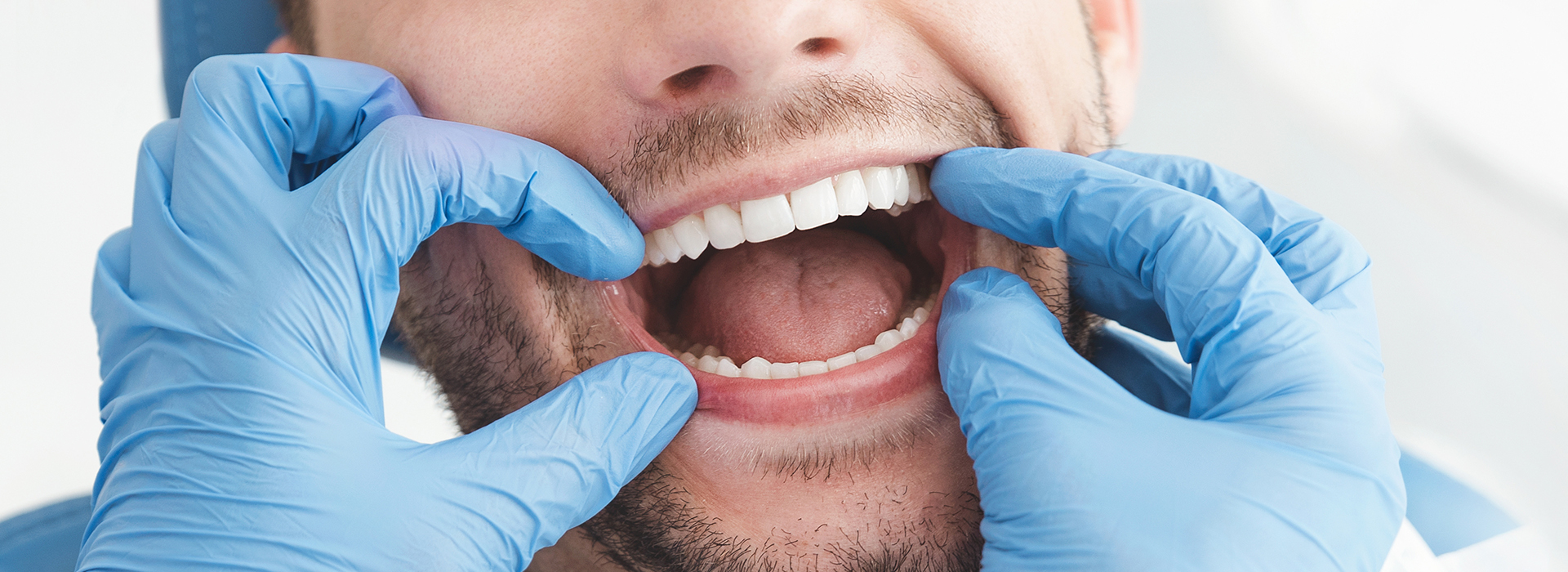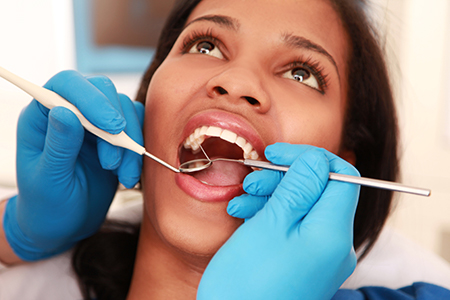
Our Office
Visit Us Online

At the office of Frankford Dental Group, we take a proactive approach to preserving healthy mouths and confident smiles. Regular oral exams are the cornerstone of preventative dentistry: they help us spot early signs of decay, gum disease, tissue changes, and other issues before they become more complex. During an exam, our team combines careful visual inspection, targeted questions about your medical history, and the appropriate diagnostic imaging to build a complete picture of your oral health.
Your first comprehensive exam with us is designed to establish a clear baseline so we can tailor care to your needs. We begin by reviewing medical and dental histories and listening closely to any concerns you bring—sensitivity, aches, or recent changes in your mouth are important clues. From there, the clinician performs a thorough clinical inspection of the teeth, gums, tongue, cheeks, and the soft tissues of the mouth.
A careful evaluation also includes checking your bite and jaw function to identify signs of clenching, grinding, or temporomandibular joint (TMJ) strain. If necessary, we recommend diagnostic radiographs to visualize what lies beneath the surface—x-rays reveal decay between teeth, the condition of roots, and the health of the supporting bone. We factor in medications, diet, and lifestyle habits that can affect oral tissues so that our recommendations are comprehensive and relevant.
Following the exam, our team will review findings with you in plain language and outline any recommended next steps. Whether that means a routine cleaning, targeted preventive measures, or a referral for specialized care, we make sure you understand your options and the rationale behind each suggestion. Our goal is to empower you with information and a clear plan for maintaining long-term oral health.

Oral exams are about more than teeth; the mouth can reflect changes happening elsewhere in the body. During routine screenings we look for signs that may indicate broader health concerns—persistent gum inflammation, unusual lesions, or long-standing dry mouth can sometimes point to systemic conditions. Documenting these signs early allows us to advise appropriate medical follow-up when needed.
Research increasingly shows relationships between oral conditions and diseases such as diabetes, cardiovascular concerns, and respiratory issues. That does not mean one causes the other in every case, but it does mean that a thorough oral exam is an important part of monitoring your overall health. Our team is attentive to patterns that warrant coordination with your medical providers to support your general well-being.
Equally important is screening for oral cancer. During each exam we inspect the mouth, throat, and neck for unusual tissue changes or lesions that require closer observation or biopsy. Early detection dramatically improves outcomes, and routine examinations provide the best opportunity to identify subtle changes before symptoms develop.

Consistent care is the most effective way to prevent decay and gum disease. Professional cleanings remove plaque and hardened deposits that are difficult to eliminate with home brushing and flossing alone. During these visits, our hygienists also polish the teeth and provide personalized coaching on brushing technique, flossing strategies, and products that suit your oral environment.
Routine checkups give us the chance to catch small problems when they’re simplest to treat. For many patients, regular visits every six months are an effective rhythm, but we tailor recall intervals to each person based on risk factors such as periodontal status, history of decay, or systemic health issues. Preventive care also includes applying sealants or fluoride treatments when appropriate and discussing habits—like tobacco use or diet—that influence oral health over time.
We place special emphasis on early education for children and on monitoring developing smiles. Regular exams let us track tooth eruption, jaw growth, and bite relationships so we can recommend orthodontic evaluation when indicated. Teaching good habits early pays dividends across a lifetime of oral health, and our team is focused on making those early visits positive and informative.
Visual inspection is essential, but x-rays and advanced imaging provide a deeper view that is critical for accurate diagnosis and treatment planning. Digital radiographs let us examine the roots of teeth, detect decay beneath fillings, assess bone levels around teeth, and identify impacted or developing teeth. Because digital systems produce images instantly, we can discuss findings with you on the same visit.
Digital imaging offers clear benefits: lower radiation exposure, faster acquisition, and the ability to enlarge and enhance images for better interpretation. Storing these images in your digital record also helps us track changes over time. When more detailed anatomical information is required—such as for surgical planning or implant placement—we may recommend three-dimensional imaging like cone-beam computed tomography (CBCT) to visualize bone volume and the spatial relationships of vital structures.
We select the least invasive, most informative imaging option for each situation, balancing diagnostic value with patient safety. Clear images enable more precise recommendations, whether the next step is a restorative procedure, periodontal care, or targeted monitoring. Our use of up-to-date imaging technology helps reduce uncertainty and supports predictable treatment outcomes.

An oral exam is the first step in a personalized plan designed around your goals, risks, and lifestyle. After reviewing your exam and images, we prioritize minimally invasive options when possible and outline a clear sequence for preventive or restorative care. That plan may include focused periodontal therapies, restorative treatments to stop decay, or ongoing monitoring for areas that need attention later.
Patient education is central to our approach. We’ll explain why a recommendation is being made, what you can expect during treatment, and how to maintain improvements once care is complete. Small adjustments—such as altering dietary habits, improving oral hygiene technique, or using a specific dental product—can have an outsized impact on long-term outcomes.
For families and individuals who prefer coordinated care, our team works to ensure continuity and consistency across visits. Whether you’re establishing a baseline for a child, managing chronic periodontal conditions, or preparing for restorative work, we provide clear guidance and follow-up to keep your oral health on track. When specialized care is needed, we make appropriate referrals and collaborate to secure the best possible results.
In summary, regular oral exams are a practical, evidence-based way to protect your smile and detect issues early. At the office of Frankford Dental Group, our examinations combine careful clinical assessment with modern imaging and a focus on patient-centered education. Contact us to learn more about our approach to oral exams and how we can help you maintain a healthy, confident smile.
Yes. We always welcome new patients and their families for care. Feel free to give us a call or reach out to us online to schedule a first visit or for any additional information on our office. We look forward to hearing from you!
Routine dental checkups and professional cleanings help ensure your smile remains in tip-top condition and that any developing problems receive the prompt care they require. While it's a good idea to schedule a checkup and cleaning twice a year, longer or shorter intervals between routine visits depend on your specific needs.
We understand that life gets complicated and busy, and for various reasons, you haven't been able to get to the dentist for care. Don't worry; it's always a good time to get back in touch with the health of your smile.
At Frankford Dental Group, we offer skilled and compassionate care to address a wide range of dental needs. Whether you need a simple checkup and cleaning, restorations, periodontal treatment, root canal therapy, or the replacement of missing teeth to get your smile back into shape, we provide precise, gentle, stress-free treatment to give you a smile that is as beautiful as it is healthy.
Give us a call today; we're happy to address all your questions and concerns about getting your smile back in tip-top condition.
For pregnant women, practicing good oral care and seeing the dentist to maintain a healthy smile is considered an important component of prenatal care. Researchers have found that pregnancy not only increases the risk of oral health problems, but these problems may also lead to pregnancy complications. At the office of Frankford Dental Group, we provide the skilled and compassionate care required to help expectant mothers keep their teeth and gums in tip-top condition. While certain procedures are not recommended during pregnancy, we provide the necessary care and take all the necessary precautions required.
Thanks to advances in modern dentistry, teeth that have been affected by a range of imperfections or that have sustained damage from trauma or dental decay can be restored to produce a naturally beautiful looking and functional smile.
As skilled and experienced providers of care, our office can effectively improve and enhance the appearance of teeth that are stained, discolored, misshapen, chipped, fractured, gapped, crowded, or broken down due to dental decay. At the office of Frankford Dental Group, we offer a comprehensive selection of the leading-edge cosmetic solutions from teeth whitening procedures, dental bonding, tooth-colored fillings, and veneers, to prosthetic solutions and dental implants to rebuild complete and beautiful smiles.
Contact our office to learn more about the many ways we can help you create the smile you've always wanted.
If you're visiting Frankford Dental Group for the first time, it is helpful that you contact your former dental office and have your records sent over to us. Make note of any problems you may have so that you can discuss them with your dentist.
To provide efficient service, we ask you to please bring your insurance card, an ID, plus any referral slips or diagnostic records given to you by another office. If you are taking medications, please note or make a list of what they are as you will need to provide that information.
Yes! We assure you that both you and your family will be in good hands at the office of Frankford Dental Group.
We do our best to make sure every patient who steps into our office for care is put at ease. We provide precise and gentle care and our skilled, compassionate team strives to make every visit stress-free. You can rest assured that your smile is in the best of hands and that we are doing all we can to ensure your comfort throughout every procedure. While we always take the time to explain every step in care, feel free to ask us any questions about local anesthesia and methods of dental sedation.
At the office of Frankford Dental Group, we strive to provide the highest quality of care to address all your dental needs. Once we've had the opportunity to examine your smile, we can give you a clear picture of any dental issues that are present, along with a quote for what the cost of treatment will be. The cost of care all depends upon the extent and complexity of issues affecting the health or appearance of your smile and the types of procedures that are required. Our goal is to make dental care more affordable so that you can begin treatment without any additional stress or delay.
Keep in mind that with routine dental checkups and periodic care, we can help prevent dental disease while treating emerging problems early in their onset to avoid larger issues and more expensive care down the road.
Routine dental checkups and preventive care procedures may be covered under your dental insurance plan requiring little to no out-of-pocket expense. We invite you to check our financial information page or give us a call to find out if our office participates with your plan, and if you have any other questions about dental insurance, dental savings plans, forms of payment, or financing options. We welcome your inquiries and do our best to help you begin care without additional stress or delay.
If you've lost a tooth due to injury, decay, gum disease, or any other reason, we recommend dental implants to replace missing teeth. Dental implants come the closest to replicating the look, feel, and function of your natural teeth.
Absolutely! Both flossing and brushing regularly are equally important to maintain your oral health. While brushing cleans the surface of your teeth, flossing cleans in between them. Flossing is important to prevent plaque buildup, which can cause gums to recede and lead to periodontal disease.
Even if you have dentures, it is still necessary to see a dentist! Dental checkups help ensure that your dentures are comfortable, fitting properly, and that there are no other problems. Beyond assessing your dentures, our dentist will also perform a thorough examination of the jawbone, and surrounding soft tissues both inside the mouth, the face, and neck, to confirm that you remain in good oral health.
Emergency dental care is a service we hope you'll never need- but if you do, the office of Frankford Dental Group is here for you!
Whether you're suffering from a chipped tooth, toothache, or any problem affecting your oral health, you can be sure to get the prompt attention and compassionate care you require at our office. Patient care and comfort are our top priorities, and we offer a comprehensive range of the most advanced services to address a broad spectrum of dental needs.
While the pain of a toothache is one of the more common reasons that patients come to our office for emergency dental care, we also promptly treat emergencies that are not necessarily painful like crowns that have been dislodged and broken dentures that leave embarrassing gaps in one's smile.
You can rest assured that your oral health is in the best of hands at our office. We'll quickly determine exactly what's wrong, explain your treatment options, and then provide the precise and gentle care you require to alleviate your discomfort and get you back on the path to oral health and wellness.
Your health and comfort are our top priorities. If your dental emergency is painful, if it affects the appearance of your smile, or if you suspect that an infection is present, our office will make every effort to see you as soon as possible for care.
At the office of Frankford Dental Group, we welcome patients of all ages for care and offer a comprehensive range of services designed to help every member of your family maintain a beautiful and healthy smile. Whether you or a loved one needs a routine checkup and cleaning, fillings, same-day crowns, a cosmetic smile makeover, the replacement of missing teeth or require the services of a skilled and compassionate emergency dentist, you can rely on our office for the highest quality care.
For more information on our office and the many services we provide, or to schedule an appointment for care, give us a call today.
An oral exam is a clinical assessment that evaluates the health of your teeth, gums, tongue, cheeks and other soft tissues in the mouth. It combines a visual inspection with targeted questions about your medical and dental history to create a complete picture of oral health. Regular exams help identify early signs of decay, gum disease and other conditions when they are easiest to treat.
Beyond detecting localized problems, oral exams support long-term prevention by establishing a baseline record to track changes over time. Findings from an exam guide individualized recommendations for cleanings, preventive treatments and any necessary restorative care. This proactive approach reduces the risk of complex procedures later and helps preserve natural teeth and supporting structures.
Your first comprehensive exam begins with a review of medical and dental histories and a discussion of any concerns such as sensitivity, pain or changes in your mouth. The clinician performs a thorough clinical inspection of teeth, gums, tongue, cheeks and bite, and evaluates jaw function to look for signs of clenching, grinding or TMJ strain. When indicated, diagnostic radiographs are taken to reveal decay between teeth, root conditions and bone health beneath the surface.
The clinician considers medications, diet and lifestyle factors that influence oral tissues to form a personalized assessment. After the exam, results are reviewed in plain language and a clear plan is outlined that may include preventive measures, restorative options or referrals for specialized care. This thorough initial visit establishes a roadmap for maintaining and improving your oral health.
For many patients, a six-month interval for exams and cleanings is an effective routine because it allows clinicians to catch changes early and remove buildup that home care may miss. Recall frequency is tailored based on individual risk factors such as history of decay, periodontal status, systemic health issues or habits like tobacco use. Patients with active gum disease, frequent cavities or complex restorative needs may require more frequent monitoring.
Conversely, low-risk patients who maintain excellent home care and stable periodontal health may be seen at longer intervals as recommended by the dental team. Periodic exams are also useful for tracking the progression of any findings and adjusting the preventive plan when needed. At Granger Dentistry, we personalize recall schedules so care is both efficient and targeted to each patient’s needs.
The mouth often reflects broader health issues, and oral exams can reveal signs that warrant medical follow-up, such as persistent gum inflammation, unusual lesions or chronic dry mouth. Research shows associations between oral conditions and systemic concerns like diabetes, cardiovascular disease and respiratory issues, so documenting oral findings helps support coordinated care with medical providers. Identifying these patterns early enables informed referrals and collaborative management when appropriate.
During an exam, clinicians note observations that might indicate systemic contributors and discuss them in the context of your overall health. This integrated perspective emphasizes prevention and helps ensure that oral care complements medical treatment plans. Clear communication between dental and medical teams can improve outcomes for chronic conditions that manifest in the mouth.
Diagnostic images such as digital radiographs provide a deeper view of dental anatomy that cannot be seen with visual inspection alone, revealing decay beneath restorations, root health, and bone levels around teeth. Because digital systems produce images instantly and with lower radiation exposure, they allow clinicians to review findings with you during the same visit and make timely decisions. When more detailed anatomical information is necessary, three-dimensional imaging such as CBCT may be recommended for surgical planning or implant evaluation.
Images are stored in your digital record so the team can compare past and current studies to detect subtle changes over time. Selecting the appropriate imaging modality balances diagnostic value with patient safety to produce the information needed for accurate treatment planning. High-quality images support predictable outcomes for restorative, periodontal and surgical procedures.
Oral cancer screening is a routine part of every exam and includes a careful inspection of the mouth, throat and neck for unusual tissue changes or lesions that merit closer evaluation. Clinicians visually and manually examine soft tissues and document any areas of concern, paying attention to persistent sores, color changes, lumps or firm patches. When suspicious findings are present, clinicians recommend further testing, monitoring or referral for biopsy to establish a diagnosis.
Early detection significantly improves treatment outcomes, which is why regular screening is essential even in the absence of symptoms. Documentation and photographic records help the team monitor small changes over time to determine whether immediate intervention is needed. Patients are also counseled on risk factors, such as tobacco and alcohol use, that can increase oral cancer risk.
Routine checkups typically combine a concise clinical exam with a professional cleaning performed by a hygienist who removes plaque and hardened deposits that are difficult to eliminate with home care alone. Cleanings include scaling to remove buildup, polishing, and targeted coaching on brushing and flossing techniques tailored to your mouth. The clinician also reviews the exam findings, updates any necessary images, and discusses preventive measures such as fluoride or sealants when appropriate.
These visits provide an opportunity to catch small problems while they remain simple to treat and to tailor home care recommendations based on your individual risk profile. Hygiene visits also allow the team to identify early signs of gum disease, enamel wear or developing restorative needs and to recommend prompt, conservative interventions. Consistent preventive care reduces the likelihood of progression to more invasive treatments.
Exams for children emphasize growth and development, monitoring tooth eruption, jaw growth and bite relationships to identify when orthodontic evaluation may be indicated. Pediatric visits also focus on education, habit counseling and applying preventive measures like sealants to protect newly erupted permanent teeth. For adults, exams place additional emphasis on periodontal health, existing restorations, TMJ function and screening for signs of wear or disease associated with aging and systemic health.
Recall intervals and preventive recommendations are adjusted for age-specific risks, with more frequent visits for patients who have active disease or higher susceptibility to decay. Both children and adults benefit from individualized coaching on home care and lifestyle factors that influence oral health. Early intervention and education for children lay the foundation for healthier adult mouths and simpler care over a lifetime.
To prepare for an exam, bring an up-to-date list of medications, recent medical information and any dental records or x-rays from previous providers if available. Note any symptoms or changes you want to discuss, such as tooth sensitivity, jaw noise, mouth sores or changes in chewing comfort, and prepare questions about preventive strategies or treatment options. Arriving with this information helps the clinician form a complete picture and speeds the diagnostic process.
Maintain your regular oral hygiene before the appointment and inform the team of any allergies or concerns you may have about imaging or procedures. Expect that diagnostic images may be taken during the visit and that the clinician will review findings and recommended next steps with you. Clear communication and preparation lead to more personalized and effective care.
Granger Dentistry combines thorough clinical assessment with modern imaging and patient-centered education to provide exams that are both preventive and informative. The practice emphasizes clear explanations of findings and tailored plans that prioritize minimally invasive options whenever possible. This approach supports predictable outcomes and helps patients make informed decisions about their oral health.
The care team focuses on continuity and collaboration, coordinating with specialists or medical providers when necessary to deliver comprehensive care. Regular exams at the practice help establish a reliable baseline and support long-term monitoring, making it easier to catch and manage issues early. Patients can expect a consistent, evidence-based approach that emphasizes preservation, prevention and clear communication.
Available after hours by appointment.
